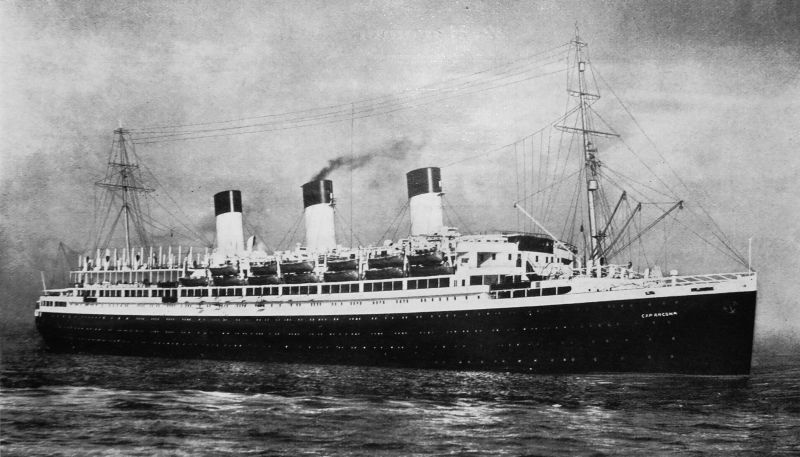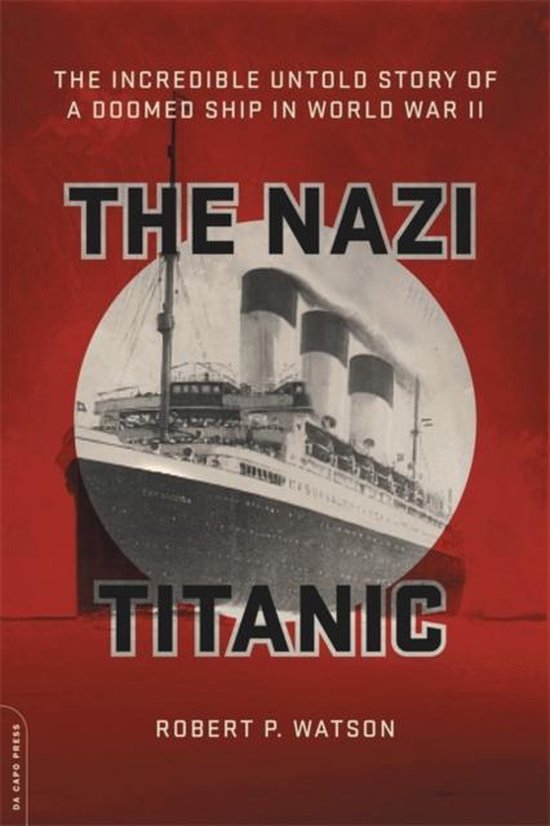The story of the 'Nazi Titanic' Robert P. Watson had to tell
Below a Q&A with Robert Watson, author of The Nazi Titanic. The following interview with the author can help the reader to understand more of the authors research, his motivations and about the book itself.

The Cap Arcona in 1927. Source: Wikipedia
How would you compare the Cap Arcona to the Titanic?
They were both considered the most luxurious ocean liners of their time and were treated with celebrity status in the press and by the public. Indeed, the Titanic inspired the design and construction of the Cap Arcona, which was a bit smaller and had three, not four, funnels. Ironically, the Cap Arcona ended up starring in the title role of a Nazi propaganda film about the Titanic. Tragically, both ships would suffer a similar end. However, over three times as many people were lost in the sinking of the Cap Arcona as perished on the Titanic.
The Cap Arcona had many lives. Can you tell us about them?
It was an extraordinary ocean liner, one of the finest afloat in the twenties and thirties. But that was only one of its lives. Like a cat, it had several—each one more bizarre and ill-fated than the last. When the war broke out, the Cap Arcona served as a floating military barracks and naval training platform, but was later used by the Nazis in their propaganda, even starring in the largest budget Nazi propaganda film ever made. It then became a rescue ship, transporting thousands of Germans across the Baltic from the advancing Red Army. Its last role was that of a floating concentration camp, ultimately becoming the tomb for thousands of victims of the Holocaust and war.
How is it that the world hasn’t heard of the momentous and tragic event you describe in The Nazi Titanic?
The tragic event had the misfortune of being sandwiched halfway between Hitler’s suicide and victory in Europe. With the end of the war, the world’s attention turned to celebration, the matter of finishing the war in the Pacific, and the many critical post-war questions facing the Allies. The British government then made the decision to seal the records on the incident for 100 years. Thus, the tragedy of the Cap Arcona, even though it was one of the final tragedies of the war, was forgotten.
Did the British RAF know that thousands of Holocaust survivors were aboard the Cap Arcona?
Yes and no. A handful of reports were sent up the chain of command that the ships at anchor in the southern Baltic were being loaded with concentration camp prisoners. However, for whatever the reason, the news was not communicated to the Typhoon pilots assigned that fateful day to disrupt German shipping. Ultimately, the Cap Arcona marked the world’s worst incident of friendly fire.
Did the Nazis intend to sink/scuttle the Cap Arcona?
Yes, from the surviving evidence it seems that this was the plan—perhaps by a Luftwaffe bomber or perhaps by a torpedo from a U-boat based nearby. It must also be remembered that the Germans had scuttled ships at the end of WWI in order to deny the victors the spoils of war. The final days of WWII were defined by chaos, and Nazi command and control systems were no longer functioning. Accordingly, there were no clear orders one way or another, and it appears that two Nazi officials in the Hamburg area—Karl Kaufmann and Count Georg Bassewitz-Behr—ultimately ordered the prisoners onto the ships for them to be scuttled.
History still has her secrets. Can you tell us about the process of researching, uncovering, and writing about little-known events in history?
Part of the challenge of writing history is to forget what you think you know—in order to be receptive to new findings and consume each document, artifact, and story with an open mind. It’s like being a detective, but the challenge is that much of the evidence and most of the eyewitnesses are long since gone. Yet, I have always been motivated by knowing that history still has her secrets. Indeed, there is more we don’t know than we do know, even about events as big as WWII and the Holocaust.
What was the most difficult aspect of writing this book?
The emotions. So many of the stories and details were so gripping and shocking that it was hard to believe they had really happened. I had trouble getting my mind around the enormity of the tragedy and the sheer amount of loss. The ordeals suffered by so many who had survived years in concentration camps were so brutal that it was a challenge to tell their stories—both emotionally and because I felt the responsibility of making sure I got them right.
What was the most rewarding aspect of writing it?
I felt, at times, like I was the first person since the war to read their stories. I felt like an archaeologist prying open a sarcophagus. I read each story with reverence and respect. Overall, the stories of survival, while as jaw-dropping as the horrors described in the book, were so compelling and inspiring that I wanted to tell the story. I felt as though I had to tell the story.

The Cap Arcona in 1927. Source: Wikipedia
How would you compare the Cap Arcona to the Titanic?
They were both considered the most luxurious ocean liners of their time and were treated with celebrity status in the press and by the public. Indeed, the Titanic inspired the design and construction of the Cap Arcona, which was a bit smaller and had three, not four, funnels. Ironically, the Cap Arcona ended up starring in the title role of a Nazi propaganda film about the Titanic. Tragically, both ships would suffer a similar end. However, over three times as many people were lost in the sinking of the Cap Arcona as perished on the Titanic.
The Cap Arcona had many lives. Can you tell us about them?
It was an extraordinary ocean liner, one of the finest afloat in the twenties and thirties. But that was only one of its lives. Like a cat, it had several—each one more bizarre and ill-fated than the last. When the war broke out, the Cap Arcona served as a floating military barracks and naval training platform, but was later used by the Nazis in their propaganda, even starring in the largest budget Nazi propaganda film ever made. It then became a rescue ship, transporting thousands of Germans across the Baltic from the advancing Red Army. Its last role was that of a floating concentration camp, ultimately becoming the tomb for thousands of victims of the Holocaust and war.
How is it that the world hasn’t heard of the momentous and tragic event you describe in The Nazi Titanic?
The tragic event had the misfortune of being sandwiched halfway between Hitler’s suicide and victory in Europe. With the end of the war, the world’s attention turned to celebration, the matter of finishing the war in the Pacific, and the many critical post-war questions facing the Allies. The British government then made the decision to seal the records on the incident for 100 years. Thus, the tragedy of the Cap Arcona, even though it was one of the final tragedies of the war, was forgotten.
Did the British RAF know that thousands of Holocaust survivors were aboard the Cap Arcona?
Yes and no. A handful of reports were sent up the chain of command that the ships at anchor in the southern Baltic were being loaded with concentration camp prisoners. However, for whatever the reason, the news was not communicated to the Typhoon pilots assigned that fateful day to disrupt German shipping. Ultimately, the Cap Arcona marked the world’s worst incident of friendly fire.
Did the Nazis intend to sink/scuttle the Cap Arcona?
Yes, from the surviving evidence it seems that this was the plan—perhaps by a Luftwaffe bomber or perhaps by a torpedo from a U-boat based nearby. It must also be remembered that the Germans had scuttled ships at the end of WWI in order to deny the victors the spoils of war. The final days of WWII were defined by chaos, and Nazi command and control systems were no longer functioning. Accordingly, there were no clear orders one way or another, and it appears that two Nazi officials in the Hamburg area—Karl Kaufmann and Count Georg Bassewitz-Behr—ultimately ordered the prisoners onto the ships for them to be scuttled.
History still has her secrets. Can you tell us about the process of researching, uncovering, and writing about little-known events in history?
Part of the challenge of writing history is to forget what you think you know—in order to be receptive to new findings and consume each document, artifact, and story with an open mind. It’s like being a detective, but the challenge is that much of the evidence and most of the eyewitnesses are long since gone. Yet, I have always been motivated by knowing that history still has her secrets. Indeed, there is more we don’t know than we do know, even about events as big as WWII and the Holocaust.
What was the most difficult aspect of writing this book?
The emotions. So many of the stories and details were so gripping and shocking that it was hard to believe they had really happened. I had trouble getting my mind around the enormity of the tragedy and the sheer amount of loss. The ordeals suffered by so many who had survived years in concentration camps were so brutal that it was a challenge to tell their stories—both emotionally and because I felt the responsibility of making sure I got them right.
What was the most rewarding aspect of writing it?
I felt, at times, like I was the first person since the war to read their stories. I felt like an archaeologist prying open a sarcophagus. I read each story with reverence and respect. Overall, the stories of survival, while as jaw-dropping as the horrors described in the book, were so compelling and inspiring that I wanted to tell the story. I felt as though I had to tell the story.
- The Nazi Titanic
- The Incredible Untold Story of a Doomed Ship in World War II
- ISBN: 9780306825439
- More information about this book


Used source(s)
- Source: Da Capo Press / vertaald door Peter Kimenai
- Published on: 28-10-2017 19:42:37
Related news
- 11-'24: Postal artifacts provide a vibrant testament to the experiences of the Dutch people during WWII
- 10-'24: DigitalBattlefieldTours unlocks military tactics to a wide audience
- 08-'24: Researching his father’s WWII history became a passion for Steve Snyder
- 08-'24: Who was the owner of the photo album from Dachau?
- 07-'24: The British people welcomed African American servicemen with open arms
Latest news
- 03-03: A WWII helmet returns home 80 years after having been lost at Remagen Bridge, Germany
- 16-02: Armin T. Wegner and his letter to Hitler
- 14-02: The hugely popular ‘Standing with Giants’ installation returns to the British Normandy Memorial
- 27-01: Russia focuses on Soviet victims of WW2 as officials not invited to Auschwitz ceremony
- 27-01: Oswald Kaduk, ‘Papa Kaduk’ or a monster??
- 12-'24: Christmas and New Year message from our volunteers
- 11-'24: New book: Righteous Behind Barbed Wire
- 11-'24: Postal artifacts provide a vibrant testament to the experiences of the Dutch people during WWII
- 10-'24: DigitalBattlefieldTours unlocks military tactics to a wide audience
- 10-'24: Lily Ebert, Holocaust Survivor, Author and TikTok Star, Dies at 100


